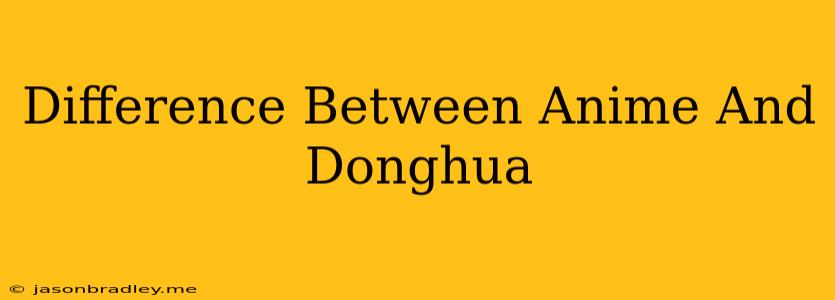Anime vs. Donghua: What's the Difference?
The world of animation is vast and diverse, with many styles and origins. Two popular genres that often get confused are anime and donghua. While both are forms of animation, they have distinct characteristics and origins that set them apart. Let's delve into the key differences:
Origin and History:
- Anime: This term refers to Japanese animation. It originated in early 20th century Japan, with its roots in the works of Osamu Tezuka, often hailed as the "God of Manga".
- Donghua: This term represents Chinese animation. While its roots can be traced back centuries, modern donghua gained popularity in the 1960s and has exploded in recent years.
Artistic Style:
- Anime: Anime is known for its highly stylized art style, featuring large, expressive eyes, dynamic poses, and vibrant colors. The animation can range from fluid and realistic to exaggerated and comedic, depending on the genre.
- Donghua: Donghua often borrows elements from traditional Chinese art, like brushstrokes and ink washes. It can range from realistic to whimsical, and it's embracing a wider range of animation techniques, from 2D to 3D.
Content and Themes:
- Anime: Anime covers a wide spectrum of genres, from action and adventure to romance and slice-of-life. It often tackles complex themes like identity, relationships, and societal issues.
- Donghua: Donghua is also diverse in its genres, but it often leans towards fantasy, historical fiction, and wuxia. The themes can range from lighthearted humor to serious reflections on Chinese history and culture.
Production and Distribution:
- Anime: Anime production is a well-established industry in Japan, with numerous studios producing a vast array of shows. Anime is distributed globally through streaming platforms and physical media.
- Donghua: The donghua industry is rapidly growing and gaining global recognition. While some donghua are available on international streaming platforms, it is still primarily enjoyed by audiences in China.
Examples:
- Anime: Naruto, Attack on Titan, Spirited Away, Your Name
- Donghua: The King's Avatar, Hitori no Shita: The Outcast, Wu Geng Ji, Mo Dao Zu Shi
Conclusion:
Both anime and donghua offer unique and engaging forms of animation with their own distinct characteristics. While they share a common love for storytelling and visuals, their different origins, artistic styles, and themes provide a rich tapestry of animation experiences.
It's important to remember that these are general trends and there are exceptions. Some anime and donghua may share similarities in style or content. Ultimately, the best way to explore the world of anime and donghua is to simply dive in and discover what appeals to you!
